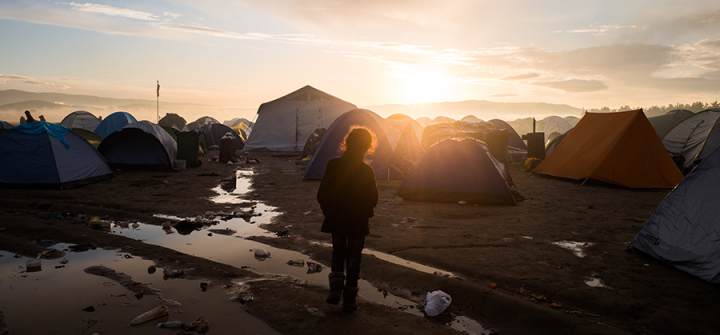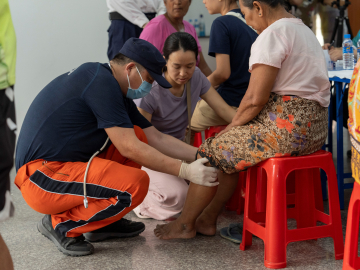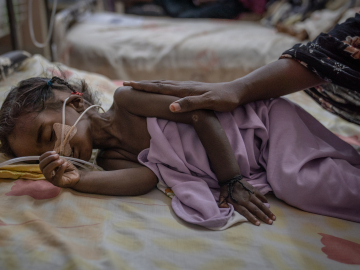How to Fix the Broken Humanitarian System: A Q&A with Paul Spiegel
Even as the world struggles with multiple crises that have forced tens of millions of people from their homes—a scale unseen since World War II—the humanitarian response system designed to help them is broken, says Paul Spiegel, author of an article in a Lancet series on humanitarian response that launched on Thursday.
Reconfiguring humanitarian response to make it more coordinated and effective in dealing with prolonged crises like that of Syria is essential for the future, says Spiegel, director of the Hopkins Center for Humanitarian Health at the Johns Hopkins Bloomberg School of Public Health. What does this reconfiguration look like? Stronger command and control of response, integration of displaced people into local economies and national health systems and fewer organizations involved in response, says Spiegel in this GHN Q&A.
You’ve said that the humanitarian system is broken. How is it broken?
I think it did extremely well for many decades, but it was created for a time when the emergencies were shorter. They weren’t as complex as they are now. Emergencies are becoming more and more protracted. We’ve seen this in terms of both the conflict itself lasting for many years as well as the forced displacement: A refugee is a refugee for over 10 years now. The [weaknesses of] the Band-Aid approach and the division between development and humanitarian response … are now becoming more apparent. The system is clearly not able to function.
If you could fix one thing about humanitarian response, what would that be?
I think one would be to ensure that the response takes into account the longer, protracted nature of the situation where people are displaced. We cannot do a response that is for refugees or for internally displaced persons alone. We need to think about where they are and the future development of where they are located with the understanding that they’re going to be there for a while. We need to avoid parallel services when possible. We need to think about how the services should be integrated into the host communities, but also to make sure that the services are sufficient for the refugees while improving the existing services for the nationals. It needs to be a win-win situation where displaced persons and nationals can benefit.
Is that a tough sell for national governments who are probably feeling, “We’re taking on all these refugees. We don’t want them to be too comfortable. We don’t want them to stay too long?”
Yes. Yes, absolutely. It’s not going to be easy from a political point of view, but that is why our policies need to change—in terms of humanitarian and development funding, but also private-sector funding. If we can use and/or develop the skills of these displaced people together with those from the community, we can improve the local economy. In some countries there are artisans who are working with nationals to develop products that are being sold abroad. Multinational companies will hopefully soon be promoting these products. Various government as well as the World Bank and others are working to reduce import tariffs… so we’re looking a little bit more globally and less just at where the refugees are located.
It sounds like humanitarian organizations really don’t have the luxury of thinking about just pure logistics in terms of setting up tents and getting food and water. They have to really approach things much differently.
Yes, and I think that must be the change that we need to see. However, it can’t all be left to these humanitarian organizations alone, obviously. We need to be able to work more closely with development organizations, with the private sector and with other governments.
One of the papers in this series has found that the evidence in humanitarian crises is limited both in quantity and quality. Why is that?
Number one, I would say it has improved significantly compared to the past, which is positive, but we still have a long way to go. There are methodological limitations because of the unstable settings and movement of people, but there’s also a mentality that needs to change of - “We need to act, and therefore this is not a place in these emergencies where we should do research. And if we do research, it means there’s less money for response.” Furthermore, what I try to make clear in my article is that there’s a significant amount of wastage, and there’s a lack of guidance to allow us to better prioritize and to be more cost-effective.
Can you ethically do randomized controlled trials of public health interventions in humanitarian emergencies?
Absolutely. The basic rule is that one tries not to do research in these situations when that research can be done elsewhere because of the vulnerability of these populations. But there are many situations where we need to be able to know what works specifically in these situations. As long as we can implement the intervention in one group while the other groups receive the accepted standard of care, it’s not only ethical, it’s imperative that we do so to improve how we respond.
Are there examples out there of, you know, sort of the very best in terms of evidence-based responses?
Let me respond also by saying that sometimes we have the evidence, but it’s actually not being implemented. There are security limitations. There are financial limitations. A good example are the “exceptional care committees” developed by UNHCR and the NGOs and implemented in Jordan and Lebanon [that look] at the expense of tertiary care for refugees. These committees make decisions about who will receive a tertiary care according to three criteria, primarily prognosis, cost, and vulnerability.
In your article in the series, you argue that leadership and coordination need to be completely remade rather than just revised. Can you unpack that for our readers?
Sure. What we have found is that, one, there is often a lack of accountability … not just the money but also the outcomes. Right now, there’s not always someone that’s clearly in charge of these situation or at least who can enforce and make difficult decisions that will be implemented. The coordination system is less of command control, and more of a consensus system. And I think that needs to change. And number two , we have developed systems—the most well-known is the cluster system, which has become far too process-heavy—and what we’re often measuring are not impact or outcome indicators but really simple process indicators. We often don’t know the effects of what we’re providing, but rather only the number and type of medicines have been provided, and that’s insufficient. In my view, there needs to be fewer, more operational partners that can do the job and get it done well; there needs to be more accountability from the organizations who are delivering this care.
In many humanitarian crises a lot of different organizations want to help and want to jump in, but you state that the response needs to be much more controled and centralized.
It doesn’t need to be centralized at a Geneva or a Washington level, but there needs to be someone on the ground—not even necessarily in the capital level but as close to the affected populations as one can be—[who is] going to make decisions. It just can’t be a free-for-all where anyone who wants to help will be able to come in and set up shop. Humanitarian action is a profession now. It’s nice to be idealistic, and it’s important to be idealistic, but this is a profession, and we need to make sure that we provide services as efficiently and effectively as we can, and that means a limited amount of organizations that have the expertise and experience, who are operational.
Are there any glimmers of hope out there for the future of response to humanitarian crises?
I think so. We’re going through a hard time. There’s no question. The bottom line is that the solutions to these crises are not humanitarian. They’re political, and I don’t see many of the crises resolving at present. We see populism, and we see countries that are not able to get along and, therefore, we’re not seeing decisive actions to stop many of these conflicts. So, in that way, I’m not hopeful. But what does make me hopeful is the new thinking in terms of humanitarian response, thinking about livelihoods, thinking about cash-based interventions, thinking about the private sector and accountability. There are a lot of strategies and interventions that either we haven’t done sufficiently or didn’t exist in the past that are now available and slowly being scaled up. We’re seeing a lot of changes that I think will allow the humanitarian system to change into something that is applicable to the context that we’re in now.
In the past you’ve talked about direct cash payments, integration of refugees within the national health insurance programs. Are those bright lights for you in the future?
Definitely. We’ll see how cash-based interventions move forward because there isn’t enough evidence to show that it is positively affecting the health of emergency-affected populations. Overall the idea of providing cash to refugees and internally displaced people, letting them choose what they want to spend that cash on—provides dignity and choice to the people and it’s more efficient. It’s going to be a major and, I think, a very positive change as to how aid is delivered. And similarly, if we can show that by integrating refugees into health insurance systems or social welfare systems and that more money comes in to improve the national systems, then this would be extremely positive. It will reduce that warehousing of refugees and the lack of sustainability of services.
What would be the ideal response to this series? What would you love to see happen because of it?
I would like to see significant and decisive change occurring. I’m hopeful that we have reached a tipping point now where there will be enough political will from the responders, from the governments, the donors, as well as private sector, to ensure that we make serious changes in terms of stronger leadership, in terms of accountability, in terms of fewer actors that are operational and more effective.
It’s going to require—and this is what makes me a bit skeptical—it’s going to require certain organizations to say, “I’m not going to be in this field,” or, “I’m going to take in less money,” or, “I’m going to have fewer staff.” And that’s going to be a big challenge. It means giving up more autonomy to host governments and to national NGOs. There’s a huge humanitarian industry out there, and it’s hard to let power, prestige and staff go.
Join the thousands of subscribers who rely on Global Health NOW summaries and exclusive articles for the latest public health news. Sign up for our free weekday enewsletter, and please share the link with friends and colleagues: Subscribe to GHN
Refugee kid in front of hundreds of tents, during sunrise in a refugee camp in Idomeni, Greece in March 2016. Image by George Tatakis via iStock.





